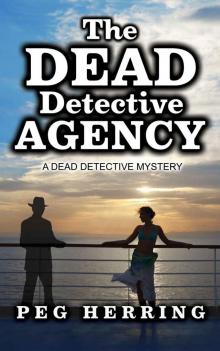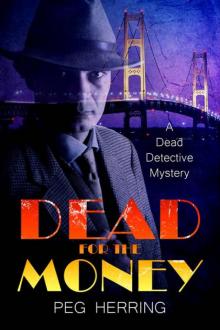- Home
- Peg Herring
The Dead Detective Agency (The Dead Detective Mysteries)
The Dead Detective Agency (The Dead Detective Mysteries) Read online
The Dead Detective Agency
A Dead Detective Mystery
By Peg Herring
Gwendolyn Press
Port Huron, Michigan
The Dead Detective Agency
© Peg Herring, 2011, 2015
Cover art by Philips Covers-www.phillipscovers.com
Printed in the USA
The Dead Detective Agency is a work of fiction. The names, characters, and incidents are entirely the work of the author’s imagination. Any resemblance to actual persons, living or dead, or events, is entirely coincidental.
All rights reserved. No part of this publication may be copied, transmitted, or recorded by any means whatsoever, including printing, photocopying, file transfer, or any form of data storage, mechanical or electronic, without the express written consent of the publisher. In addition, no part of this publication may be lent, re-sold, hired, or otherwise circulated or distributed, in any form whatsoever, without the express written consent of the publisher.
ISBN: 9780986147531
Acknowledgements
There are so many people who help a book get from idea to actuality that it’s difficult for an author to name names. However, to Barb and Janet, who read "along the way" and made corrections, suggestions, and encouraging comments, thanks for striking the delicate balance of criticism that allows me to improve but doesn't make me want to give up.
For Wendy,
who makes me laugh when we both should cry.
Chapter One
Swing Low, Sweet Chariot
Does dreaming you’re dead mean that you really die? The question came to Tori slowly as she stirred from oblivious sleep, first stretching her feet downward between the smooth sheets, twisting her hips to a more comfortable position, and finally opening her eyes enough to see that it was day. “Wake up, Van Camp,” she mumbled, but her dread didn’t dissipate as nightmares do when faced with sunlight.
As full memory returned, Tori’s eyes opened fully. She clutched her chest, dreading the warm, sticky blood certain to be there. A man had aimed a pistol directly at her. The gun had a soda bottle duct-taped to the muzzle to make a homemade silencer…a twitch of the man’s hand was followed by an odd thumping noise, and she collapsed, disbelieving. After that was nothing.
The hand at her chest found nothing unusual. There was no blood, and she was perfectly whole. Still, the image of death did not recede. The memory became more vivid, not less, the feeling it had really happened more intense. Tori could almost hear the doorbell, her footsteps as she went to answer it, the few words spoken, and the muted shot that followed.
It was not that she felt dead, and a glance at a mirror to her right revealed she didn’t look dead, either. Was her impression of death a dream? It had to be, and yet, it was so clear. It was a Sunday, and she had been in her apartment. A man in some sort of delivery service jacket had rung the doorbell and asked in a sniffling, agitated manner if she was Tori Van Camp. Receiving a “yes,” he had pulled the gun with its makeshift silencer from a canvas bag he carried and, with a nervous twitch in his cheek that corresponded to the twitch of his index finger, shot her.
She remembered nothing else, no walking toward a light, no welcome from Grandma Mueller. Grandma was undoubtedly too busy toting an oversized cup of nickels around some afterlife casino to take time to greet new arrivals. But why the memory of dying? What sort of dream was that for someone who had just reached twenty-five?
Three crisp knocks on the door startled her out of her strange reverie, and Tori took note of her surroundings for the first time. That was unnerving, for the room was totally unfamiliar. Slightly institutional, the place was on the upscale side of hotel chic: a large room with attractive drapes that matched the coverlet as well as a border that circled the walls at ceiling height in a Monet-like iris pattern in blues and greens. A small walk-in closet stood open and empty except for wooden hangers of the type that disconnect from their hooks. Beyond that, a good-sized bathroom showed through an open door, bright-white tiled walls with designs in Mediterranean blue scattered throughout.
On the dresser at bedside sat a telephone and a small tray with a coffee maker, Columbian coffee, both decaf and regular, and Earl Grey tea in two varieties. A large credenza opposite held a television, its remote resting on top. The whole look added up to something like Holiday Inn. The problem was Tori didn’t recall going on a vacation or even planning one. How had she gotten time off work? Who was watching the cats?
The distinctive three-knock pattern came again, and Tori tossed aside the thick, soft comforter and set her feet onto a carpet almost equally soft. A downward glance revealed familiar clothes: sweat pants and a T-shirt that read Books, Cats: Life Is Good.
On the other side of the door was a petite blond woman with darkly tanned skin and more makeup than a CNN anchor. Attractive in that expensively cared-for way women on television have, she wore a blazer that was bluer than blue, a pleated white skirt that reached precisely to her knees, and natural leather pumps with three-inch heels. It was a uniform of sorts, the kind that isn’t supposed to look like one but invariably does. Expensive perfume radiated from her, indicating, at least to Tori, overcompensation.
The woman’s champagne-colored hair had suffered a few too many dye-jobs, but it was attractively styled, pulled back into a curly little bun with a scrunchie that matched the blazer to perfection. She obviously had a thing for gold. There were three gold rings on each hand, gold hoops in each earlobe, bands running up the ear edges, and a gold necklace with a heart-shaped pendant.
The woman must have been smiling even before the door opened, but the smile got bigger as she spoke. “Ms. Van Camp? I’m Cinda, your hostess, okay? How was your rest?” The words came in the professionally caring tone people such as nurses and waitresses seem required under oath to adopt.
“Um, fine,” Tori replied uncertainly.
“Super!” Cinda exclaimed, more excited by the reply than was necessary. “Rest is the best thing, I say.”
Confused by the banal opening remarks, Tori tried to ignore the perfume’s heady effect and the woman’s over-the-top cheeriness. “I have some questions.”
“Of course you do.” Cinda tilted her head coquettishly. She was definitely of the perky persuasion, and while the ability to be upbeat at all times might be admirable, Tori suspected it often came from a superficial understanding of circumstances. Still, Cinda was here, apparently charged with being helpful.
“Okay, let’s see. Your questions will be answered at…” she held a clipboard and, pulling a pencil with an abrupt rip from a little Velcro pad that secured it, used its point to make her way down a sheet of names. “…ten this morning, Office 112 D, if that’s convenient for you.” The reference to Tori’s convenience must have been pure diplomacy, since she didn’t wait for a reply. “Until then you’re free to explore, okay? Breakfast is here on Deck E, and the fitness center on D is open all the time. You might get a massage, take a sauna, or visit the gym.”
“But, I don’t understand what’s happened.”
“Of course you don’t.” Cinda put a hand on Tori’s arm in a gesture that could only be called rehearsed. “That’s why you’re meeting Nancy at ten. Until then, enjoy the facilities, okay?”
Irrationally, Tori thought of the least important thing at that moment. “I have no other clothes.”
This was something Cinda was equipped to handle, and genuine enthusiasm shone through. “Okay. Down this corridor, third door on the right. They’ll fix you up.” With a business-like flourish, she replaced the pencil on the sticky pad. “Have a pleasant trip.”
“Trip?” Tori repeated.
Cinda’s smile got even wider, although Tori noticed it didn’t warm her rather flat eyes. “Nancy will explain.” She shook a finger in mock sternness, tilted her perfectly coiffed head to one side, and cranked the wattage on her smile up to full. “You relax until then, okay?”
The last “okay” did it. A confused sort of anger overcame Tori’s usual politeness, and she felt her face heat up. Where in the world was she, who was this Cinda, who was the yet unseen Nancy, and how could anyone tell her to relax when she had no idea where she was or what was going on?
“But—” She glanced back into the room, empty of anything personal, any clue to why she was there. Turning again to the doorway, she raised her finger to wave it under Cinda’s pert little (probably bobbed) nose, but Cinda was no longer there. It seemed her smile hung behind her for a few seconds, like the Cheshire Cat, but otherwise Tori stood looking at an empty corridor.
Chapter Two
Welcome to the Jungle
The cop who’d been first on the scene tried to behave as if he saw blood-soaked murder victims every day. He was young, and his uniform, with its “Grand Rapids Police Department” insignia on the blue shirt, was almost out-of-the-box new. Madison was pretty sure this was the first attractive female the guy had found shot dead in her quiet little apartment.
It was Sunday evening, and Madison had taken the call, driving from his place on the northwest side to an apartment building on the other side of Division, the street that separated Grand Rapids in half. Fulton Street crossed just south of there, further dividing the city into quadrants called, logically enough, Northeast, Northwest, Southeast, and Southwest Grand Rapids. Tori Van Camp lived in the Northeast sector. Had lived, he corrected himself. Past tense.
He glanced at a photo on the wall, the dead girl and someone who was probably a relative posed with their arms around each other in front of the Space Needle. Madison glanced at the body on the floor, comparing the corpse with her picture. She showed traces of Dutch ancestry, white-blond hair framing a softly rounded face, Delft-blue eyes that apparently needed no corrective lenses, full lips and cheeks that looked faintly rosy within a clear, slightly pale complexion. He guessed she’d been almost the same height as he was, six feet.
The rookie cop—Barrett, according to his badge—was the earnest type who enters police work with a sincere desire to protect good citizens. That was hard to do when they were already dead. He kept shifting his weight, his gaze drawn to the corpse as if fascinated yet repelled. His nose twitched in rebellion at the smell of death in the room. “She wasn’t bad looking,” he said to no one in particular.
“Yeah,” Madison answered grimly. “Bet she looked a lot better without that hole in her chest.” A .44 slug made an almost innocuous entry but on exit created a real mess. Blood spread around the woman in a dark, irregular circle. The others, intent on their tasks, paid the comments no mind.
The young cop watched Madison closely, apparently anxious to learn about murder investigation procedures. As the second largest city in Michigan, Grand Rapids had its share of crime, but this case seemed different already: no obvious connection to drugs, no violent quarrel reported by the neighbors. The girl had moved to Michigan fairly recently, according to Barrett. The building was in a safe neighborhood, and the victim seemed unlikely for any crime more serious than jaywalking. The rookie’s gaze followed the detective’s as he surveyed the apartment, taking in the whole before breaking it down into usable clues.
The place smelled of blood, of course, but under that was the scent of Pine-Sol or something like it. The girl was dressed casually, and there was a bucket inverted in the kitchen sink. She had been cleaning, had probably just finished when the knock came on the door. Madison stepped into the hallway and checked. Not a knock, a bell. He tried it, causing an irritating buzz that made the forensics guys frown before returning to work.
There were books everywhere, an eclectic mix of classics, mysteries, and bestsellers. The girl had definitely been a reader. Other than that, the apartment was furnished in what Madison thought of as “girl style.” Although nothing in the place was expensive, there were added touches women seem to require, like birds feathering their nests. A bright pink throw pillow on the gray love seat coordinated with gray-and-pink tab-top curtains, and other items in the room echoed those colors. For contrast, small rose quartz ornaments were set in several areas, their paleness complementing the brighter pinks. Madison thought of his own place, furnished in what he liked to call “separation chic,” whatever he got to keep when a relationship ended.
Stepping into the bedroom, Madison started briefly at a sound from the half-open closet but relaxed when its source became clear. A cat had bumped against the louvered door in its haste to get out of his sight. In the opposite corner he saw the gleam of a second pair of yellow eyes. Two cats, spooked by the presence of strangers and death in their domain.
He scanned the room. The bed was neatly made, the dresser arranged just so with an array of bottles and tubes containing more girl stuff. He saw more books, a few posters on the wall depicting scenes of natural beauty in what might be the Cascade Mountains, and some kitschy stuff probably bought on sightseeing trips.
“We’re done here,” someone from the forensics team called. “Okay if they take her?” He returned for a final look at Victoria Van Camp, homicide victim.
The body lay where it had fallen, and Madison bent once more to examine it closely. She must have died almost instantly. Looking up, he noticed the young cop still hovering, his expression eager. The kid wanted to be of help but had become extraneous once he had reported the crime. Madison took pity on him. “Why don’t you talk to the neighbors, see if anyone saw a stranger come up here?”
“Right.” Glad to have a concrete task, Barrett left the apartment, carefully sidestepping the area around the body. He avoided touching the door frame too. Well-trained, Madison noted, probably hadn’t screwed up the scene the way some rookies did.
The girl lay inside the doorway on her back. Except for the hole in her chest and the stillness of her form, she might have been examining the ceiling above for cobwebs. She’d been shot once and fallen backward into the apartment, allowing the killer to simply close the door on his work. There’d have been noise, but people in apartment buildings learn to ignore occasional bumps and thumps in order to get along together. Only the concern of her neighbor had prevented the crime from going undiscovered for days.
Everyone with a job to do on scene was finished, and they waited patiently for his okay. Madison nodded to the attendants, who moved efficiently to take the body away to where it would be probed, sliced, and minutely examined. Not a nice thing for a pretty girl, and not the type of crime he saw often. Grand Rapids had a better reputation than Detroit, a genteel background as the furniture capital of the Midwest, and a lot of wealthy residents, though not so many now that Michigan’s economy was in deep trouble. Still, respectable citizens expected to be safe in their own apartments. Madison would be pressured to solve this one before the press made noises about police incompetence.
His next task was an interview with the neighbor who had called Barrett in. Madison went next door to his place, where the man had been taken to recover from the shock he’d suffered. The manager was with him, Barrett reported, because the old guy had taken the girl’s death hard.
Madison rapped on the door, calling out his name, and a forty-ish woman in mismatched, spotted polyester answered, ignoring the badge he flashed and opening the door wide. “He’ll be right out. Go ahead and sit. I’ve got to get back to painting 6A.” With that, she was gone. A line from a poem read in high school flashed through Madison’s head, something about people moving on, since they were not the ones dead.
Once the door closed behind the manager, Madison waited. A rhythmic click sounded from the bedroom, and in the doorway the apartment’s occupant appeared, leaning heavily on a walker propelled before him with s
nail-like progress. Various odors of extreme age preceded him, among them arthritis rub and the faint smell of urine. Along with the man came an equally arthritic dog, its metal I.D. tag clinking as it waddled forward at his side. It was one of those rag-mop things, its eyes almost hidden by tufts of hair, and its tail a complete circle of fluff.
“Come in, sit,” the old man said loudly. “I’ll get there, just give me time.”
Madison complied, although he debated helping the old guy. The place was stuffed with—well, stuff. Dated furniture and other detritus of a long life was packed in until there was barely room to move around. Madison imagined the sifting process that had occurred, perhaps through several residences, downsizing each time until what he saw represented four-score years of life.
The man pushed the walker ahead by inches, using his arms to support as much weight as possible as he forced his reluctant feet to catch up to it. Finally, he reached the chair that was apparently his accustomed place and, with painful slowness, backed up to it and collapsed downward, knees unable to slow his descent. Air rushed from the chair seat in a whoosh of protest. As he shoved the walker aside and regarded Madison expectantly, the dog waited, its whole body a question. When no invitation was issued to the chair, the creature sank with a sigh to a resting position on the floor, head on its front paws.

 Macbeth's Niece
Macbeth's Niece KIDNAP.org
KIDNAP.org The Dead Detective Agency (The Dead Detective Mysteries)
The Dead Detective Agency (The Dead Detective Mysteries) Dead for the Money
Dead for the Money